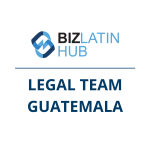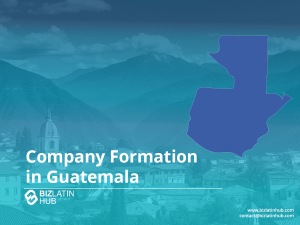Find out how to form an NGO in Guatemala to support social causes through nonprofit activities.
Guatemala continues to experience economic stability with a GDP growth rate of 3.6 percent in 2019. Moreover, the strategic location and a great number of natural resources place Guatemala as a country with great potential to develop socially and economically.

The Guatemalan government is dedicated to promoting the creation of NGOs in the country by offering benefits to interested parties. This is part of a wider initiative to improve social welfare in the country.
Forming an NGO in Guatemala would benefit you and the social development of the country. Furthermore, executives must consider that Guatemala has an estimated growth of 4.4% for 2021, offering an increasingly attractive market to establish an entity.
Why establish an NGO in Guatemala
In Guatemala, there are many opportunities to improve the social environment, and forming an NGO is the perfect method for doing it. Some areas of action that needs the support of private and public entities in Guatemala include:
- Education
- Planning for families living in poverty
- Combat malnutrition
- Housing
- Environmental protection.
Forming an NGO in Guatemala allows people to manage donations and start initiatives in order to accomplish social objectives.
Types of non-profit and non-government organizations Guatemala

There are three ways to establish a Non-Government Organization in Guatemala, civil associations and foundations can attain the status of NGO depending on its activities.
Civil Association
This a type of NGO that protects trade unions, economic, religious, social, professional, and political interest.
Furthermore, the civil association is incorporated by the approval and registration in the Legal Entities Registry (Ministerio de Governación) in some cases they will also need to the registry at the township where the entity is located.
Foundation
The principal feature of the foundation is that needs to be incorporated with a minimum capital of approximately US$6,300. Moreover, it needs to be formed by at least two persons.
Finally, the articles of incorporation of the foundation must detail the assets owned, the purposes of the assets, and how the assets are going to be managed. The foundation will also be registered by the Ministry of Government.
Non-Government Organization
The Non-Government Organization) is the third form to establish a nonprofit organization in Guatemala. NGOs provide social services, assistance, or charity, and they participate in social and economic development.
Furthermore, the NGO’s goal must include the promotion and creation of social, economic, cultural and environmental policies. As mentioned, the civil associations and foundations can be registered as an NGO if they comply with the requirements.
As the other legal entities, the NGOs will also register at the Ministry of Government. Finally, the entities registered as an NGO may access the government fund established by the Guatemalan Constitution. This guarantee fund will support the finance of social works.
Requirements to be registered as an NGO in Guatemala
All Non-profit associations can develop social initiatives, but being registered as an NGO grants certain benefits that civil associations and foundations do not have. That’s why is important to clarify the requirements needed to be registered as an NGO in Guatemala.
The constitution of the NGO is regulated by the Decree 02.2003 of Guatemala.
Articles of incorporation
NGOs must include the following information in its articles of incorporation:
- Denomination, object, nature, address, term and purpose of the NGO
- Members, income requirements, rights and obligations
- General Assembly: integration, sessions, convocation, resolutions, quorum and attributions
- The Board of Directors: integration, the election of the members, inauguration and duration in the positions, resolutions and attributions or functions
- The patrimony and economic regime: integration, destination, and inspection
- The disciplinary regime: faults, sanctions, procedure and resources
- Process of how to proceed with the Modification of the statutes: a quorum of approval and resolution
- Describe the process of dissolution and liquidation and its possible causes
- And, show an explanation or interpretation of the statutes.
Moreover, the NGO in Guatemala need to be formed by at least 7 members, that can be natural persons or legal entities.
Finally, is important to consider that NGOs in Guatemala can have foreign members up to 25% as long they’re residents in the country.
Accounting obligations

NGOs have the obligation to register with the Superintendence of Tax Administration (Superintendencia de Administración Tributaria or SAT), for its register and control of its complete accounting. Furthermore, these entities need to follow general accounting principles of Guatemala.
The accounting records of an NGO in Guatemala must include:
- Inventory books
- Journals
- General ledger
- And, financial statements
Fiscal treatment
NGOs will be audited by the Comptroller General Accounts (Contraloría General de Cuentas), and for this purpose, they must provide the information and documentation that it requires.
Additionally, the NGOs will not be able to distribute any kind of utilities or dividends in favor of its members.
NGOs are exempt from taxes if they follow these rules:
- The NGO must be registered as an exempt organization with the SAT.
- The earned income is derived from donations. This income must be applied to the primary objective´s of the NGO established in the articles of incorporation.
- The profits and assets are no distributed among its members directly or indirectly.
Dissolution and liquidation process
The causes of dissolving an NGO in Guatemala are the following:
- When the organization cannot continue with the purposes indicated in its statutes.
- By the extraordinary general assembly, with the vote of at least 60% of its members.
- By legal resolution of a competent court.
After the entity is dissolved, it will proceed with the liquidation process, for this they will be assigned at least to liquidators with the following obligations:
- Represent the NGO.
- Require the account of its administration to any person who has managed interests of the NGO.
- Fulfil the pending obligations.
- Grant settlements.
- Present and submit the final report to the ordinary assembly for approval
- and, submit to the Civil Registry of the corresponding municipal seat the Documentation to the registry the dissolution and liquidation of the NGO.
Finally, it´s important to consider that once all the obligations of the NGO had been paid, the remaining assets will be transferred to the government.
Form your NGO in Guatemala with Biz Latin Hub
The Guatemalan legal framework enables people and associations to fulfil a number of social causes. In Guatemala, there are many initiatives that can be supported.
When forming your NGO in Guatemala, members must ensure they operate in full compliance of local legal requirements.
During this process, it’s crucial to engage with an experienced, trusted legal and accounting services provider to support businesses through the market entry and registration process.
Biz Latin Hub has a series of legal and accounting services that support the formation of NGOs and other legal structures in Guatemala. Our bilingual team of professionals are ready to support and offer guidance to those establishing themselves in the country.
Contact us for a personalized consultation today.
Learn more about our team and expert authors.






